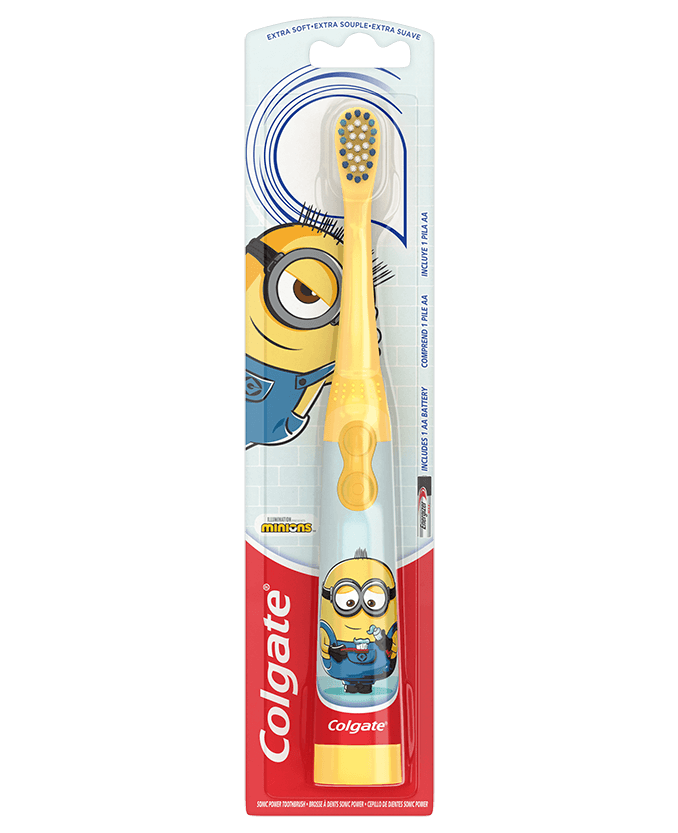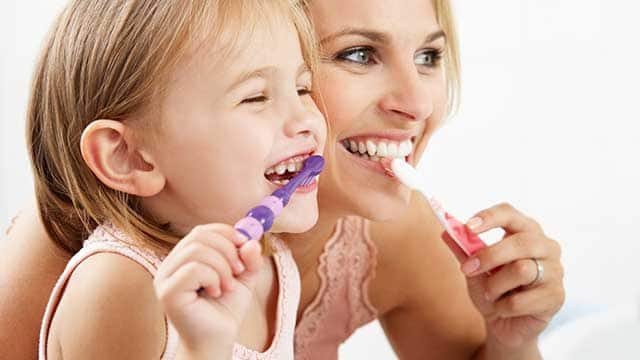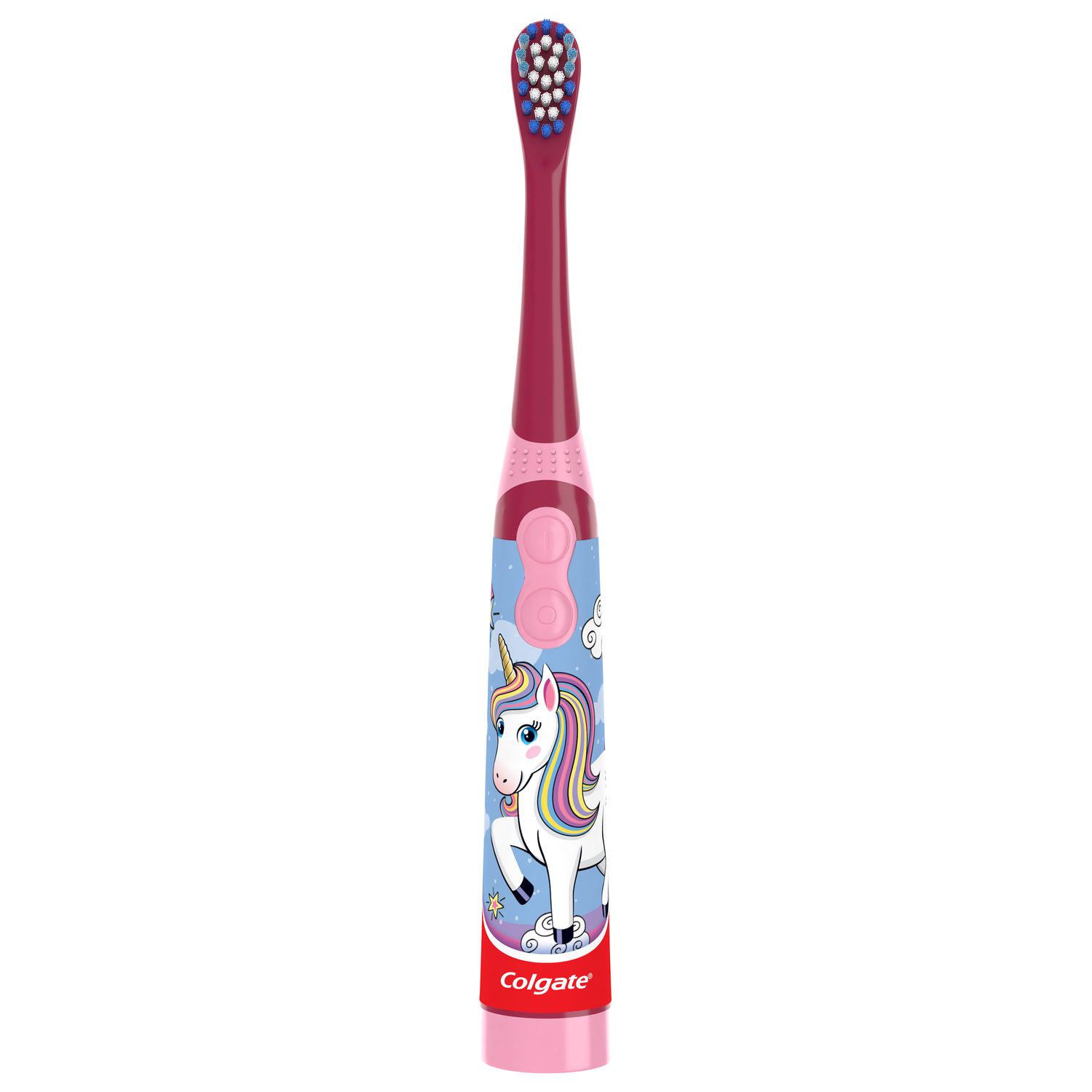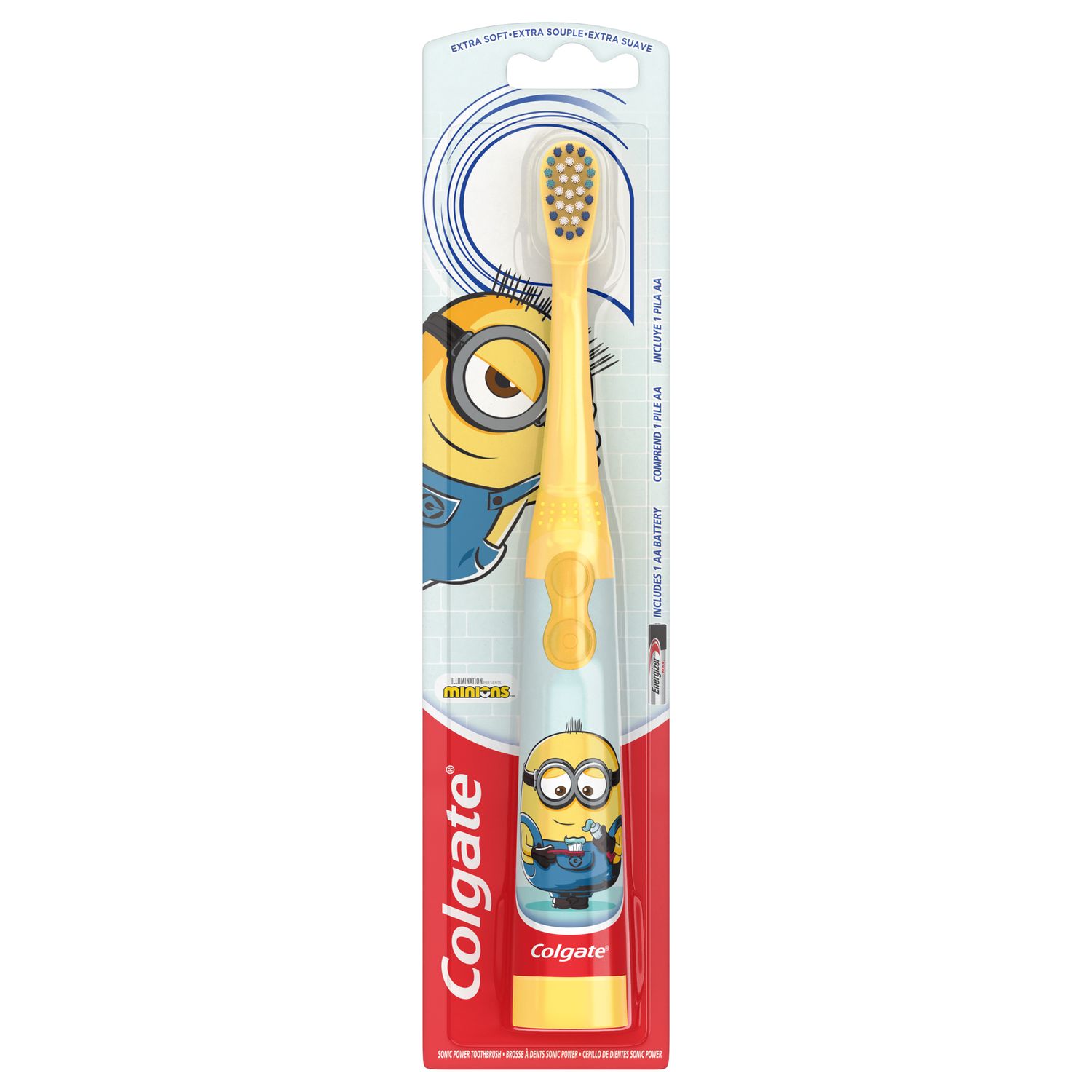

Battery Toothbrush, Minions
The Colgate Kids Minions Battery Toothbrush provides a great clean made fun.
Why Brushing Is Important At Any Age
Some parents might fall under the false assumption that it's not a big deal if children don't brush their teeth twice a day. They will lose those baby teeth anyway, right? But by not brushing now, your child can experience tooth decay, pain or discomfort, problems eating or speaking, and issues with the eruption of their permanent teeth. Plus, not brushing at a young age can set up bad dental hygiene habits in the future.
According to the Centers for Disease Control and Prevention (CDC), tooth decay is one of the most common chronic conditions in kids, affecting about 20 percent of those between 5 and 11. If your child won't brush their teeth, there are a few ways you can establish this healthy habit.
How to Get Your Child to Brush Teeth Properly
Start teaching your child to brush their teeth as soon as they can hold a toothbrush. During those early years, you'll need to assist them until you are confident they can do it independently. Some children refuse to brush their teeth at all, but if you're only struggling to get your child to use proper technique, these activities might help:
- Educate with Fun Books & Videos. If you can't convince your child that proper oral care is important, maybe your child's favorite book or TV character can. Many popular books, TV shows and online videos are designed for teaching children how to take care of their teeth and encourage healthy oral care habits.
- Teach Through Play. Kids often learn through play, so use age-appropriate dental activities to help your kids learn about dental hygiene and encourage proper brushing. For example, use a poster board to draw a smiling face with teeth. Use a marker to color those teeth yellow, and allow the kids to paint the teeth white. Talk about the importance of cleaning teeth, so they stay white and healthy.
- Use a Timer. One of the biggest obstacles to proper brushing is getting your children to brush for the entire two minutes. Turn this into a game by using a timer to help them understand the proper brushing length. You can use an hourglass timer or even an app on your phone to keep your kids on track.
- Make a Special Dental Visit. Regular dental checkups can be another way to encourage proper brushing. Your child's dental professional can demonstrate proper cleaning techniques and give them tips for a sparkling and healthy smile. Make these visits a fun activity by combining them with fun family time — like a trip to the local park or museum or a picnic with healthy snacks.
How to Make Toothbrushing Fun
No matter how often you explain the importance of clean and healthy teeth, some children will still refuse to brush. If you're tired of the tears and fights, try these tips for making brushing fun for that child who just won't brush their teeth.
- Lead by Example. Toddlers often love to mimic what their parents are doing. Use that to your advantage by brushing together. Watching you brush your teeth can make the process more interesting for your toddler, and you can set a great example simultaneously. If you're courageous, let your toddler practice brushing your teeth while you brush theirs. Funny faces are encouraged.
- Sing and Brush. Everything is more fun with music, and teeth brushing is no exception. Find a song about brushing to sing to your child, or make some simple lyrics on your own. You can even let them pick out one of their favorite tunes to play — bonus points if the song lasts for two minutes to encourage thorough brushing.
- Play Games. Use props, games, or apps to add an element of fun to toothbrushing. Bring along a favorite stuffed animal or doll, and let your child practice brushing its teeth while you brush theirs. Pretend a dirty puppy is hiding in their mouth and "chase it away" with the toothbrush. Or take advantage of mobile apps that play music or use characters to encourage kids to brush their teeth.
- Let Them Choose. Practicing oral care is not an option, but you can still empower your child with choices when it comes to teeth brushing. Take your child to the toothbrush aisle at the store and let them choose a toothbrush or toothpaste in a fun color or with their favorite character. You could even have multiple toothbrushes available and let them choose which one to use when it's time to brush.
- A Note From the Tooth Fairy. Kids love getting money from the tooth fairy. If your child refuses to brush their teeth, place a note from the tooth fairy on the bathroom mirror informing them that there's no payment for teeth that haven't been properly brushed. And the tooth fairy knows everything (wink, wink).
- Reward. Sometimes a little extra motivation is all that's needed to encourage brushing. Create a simple progress chart, and let your child place a sticker every time they finish brushing their teeth. This visual aid gets them involved in the process and helps them stay focused on the task. You can also provide little rewards — like an extra story at bedtime or the ability to choose the next family board game or five minutes of extra screen time — to motivate them even more.
When Your Child Still Refuses to Brush Their Teeth
If you've exhausted all these ideas and your toddler still won't brush, there might be an underlying issue. Sensitive teeth can make practicing oral hygiene particularly unpleasant. Ask your child if they're experiencing pain when they brush their teeth. If they are, speak to your child's dental professional about the issue and see if some products or practices can relieve some of the pain.
No matter the reason for your child's resistance to oral care, remember that a large part of passing along good habits to your child is practicing good habits yourself. Brush at least twice a day, and don't forget to brush your tongue. Clean between your teeth with floss, interdental brushes or water flossers at least once a day. Consider using other helpful products like an antimicrobial mouthrinse and a tongue scraper. And visit your dental professional for regular checkups. When your child sees you prioritizing healthy habits (especially if you make it fun), they're more likely to do the same. That's something you can both smile about.
Oral Care Center articles are reviewed by an oral health medical professional. This information is for educational purposes only. This content is not intended to be a substitute for professional medical advice, diagnosis or treatment. Always seek the advice of your dentist, physician or other qualified healthcare provider.
ORAL HEALTH QUIZ
What's behind your smile?
Take our Oral Health assessment to get the most from your oral care routine
ORAL HEALTH QUIZ
What's behind your smile?
Take our Oral Health assessment to get the most from your oral care routine















